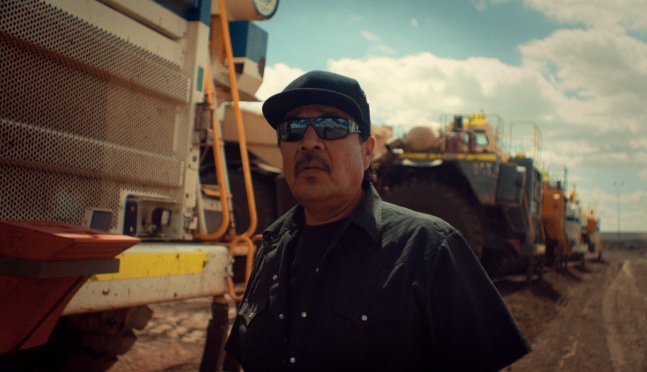Watching The Blessing, Hunter Robert Baker and Jordan Fein’s exquisite portrait of one family on the Navajo reservation in Arizona, during the Santa Fe Independent Film Festival this month marked one of the rare times I’ve seen a doc that could have used a longer (theatrical) cut. So wrapped up was I in the everyday struggles of Lawrence Gilmore, a single father of five, and his nonconformist daughter Caitlin, that I could have used an added half hour or so of breathing space between scenes, some time to pause and take a break from this unrelenting, emotionally traumatic, complicated drama.
Middle-aged, but looking years older from the physical and psychological toll his job as a coal miner has wrought, Lawrence is a nearly Shakespearean character – a deeply religious man who, as he puts it, walks in two worlds. Since the 60s Peabody Energy has been the one and only industry in this area of Indian country. But to be a miner means performing daily sacrilege. For the Navajo, strip mining the Black Mesa for its billion dollars of coal is basically raping what they consider a sacred female mountain. Yet an entire community, if they want to feed their families, is forced to do just that. It’s as if a devout Hindu village’s only means of making a living were slaughtering cows at the local meatpacking plant!
And then there’s Lawrence’s daughter Caitlin (also with a face worn beyond her teenage years), part of the new generation, but an equally conflicted (and Shakespearean) character, torn between wanting to make her dad proud of her and her desire to be true to who she really is. To save her father from worrying, Caitlin tells Lawrence she’s running cross country – even as she sneaks off to train with her high school football team. While Caitlin struggles to be sensitive to her rather conservative father this quiet teen is also strong-willed, and unapologetic about her identity (perhaps made easier by the fact that Native culture has long been accepting of gender fluidity).
Indeed, one of the most beautiful scenes in The Blessing occurs on the football field right after the much-anticipated homecoming game. With Lawrence looking on from the stands, his cornerback/kicker daughter takes off her helmet and puts on a tiara and sash. Locking arms with another player, who’s similarly crowned, they proudly march across the green – to be anointed homecoming queen and king. Afterwards, Caitlin’s stoic dad reacts in his own unconventional way, telling the camera that seeing his daughter as “the homecoming queen on the 50-yard line, that’s something you don’t see everyday.” And that it’s “pretty neat.”
For Lawrence’s biggest fear for his kid has nothing to do with societal acceptance – a man who prays every morning, asking for forgiveness for the environmental destruction he has caused to mother earth, has no time for such middle-class anxieties. He worries instead about her economic independence, especially since Caitlin – a creative soul whose personal journal contains such deep thoughts on her sexuality as, “I’m experiencing, not experimenting” – wants to be a writer. He also frets about the society his children and grandchildren are growing up in, one in which we “take and take and never give back.” Historical trauma (including Lawrence’s own forced “Americanizing” at the hands of the Mormon Church when he himself was just a boy) has left generations of indigenous people scarred. And yet his reply as to why he spends his downtime bringing coal for winter heating to the elders seems so obvious to him as to beg the question. “We do it because they need our help. Plain and simple.” Which also makes this soft-spoken hero a much-needed moral compass in this long amoral world.
Currently on the film festival circuit, The Blessing next plays DOC NYC on November 9th.

